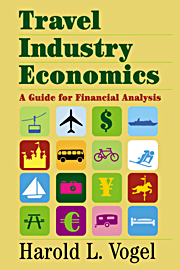Book contents
- Frontmatter
- Contents
- Preface
- Part I Introduction
- Part II Getting there
- Part III Being there
- Part IV Doing things there
- Chapter 5 Casinos
- Chapter 6 Amusement/theme parks
- Chapter 7 Tourism
- Part V Roundup
- Appendix A Sources of information
- Appendix B Valuation concepts
- Appendix C Major games of chance
- Glossary
- References
- Notes
- Index
Chapter 5 - Casinos
- Frontmatter
- Contents
- Preface
- Part I Introduction
- Part II Getting there
- Part III Being there
- Part IV Doing things there
- Chapter 5 Casinos
- Chapter 6 Amusement/theme parks
- Chapter 7 Tourism
- Part V Roundup
- Appendix A Sources of information
- Appendix B Valuation concepts
- Appendix C Major games of chance
- Glossary
- References
- Notes
- Index
Summary
It's better to be born lucky than to be born rich.
Perhaps nowhere is the preceding sentiment more appropriately expressed than in gaming and wagering, where kings and queens play amidst snake eyes and wild jokers and horses run for the roses. This chapter explores the essential economic features of this fascinating business, for whose services consumers will spend more in the aggregate than for any other forms of entertainment.
From ancient history
At first
Interest in betting on the uncertain outcome of an event is not a recently acquired human trait. As noted by Berger and Bruning (1979, p. 10), “archaeologists believe that cave men not only beat their wives, they wagered them as well.” Evidence of mankind's strong and continuing interest in gambling is found in the following historical examples:
In biblical times, the selection of Saul to govern the Hebrew kingdom was determined by lot.
An ivory gaming board was found in the tomb of Egyptian pharaoh Tutankhamen.
Palamedes, according to Greek mythology, invented dice and taught soldiers how to play with them during the siege of Troy. Ancient Greek worshippers played dice games and bet on horse races.
The Romans invented the lottery, and they wagered on the outcomes of chariot races. The emperor Nero was said to be addicted to such racing.
- Type
- Chapter
- Information
- Travel Industry EconomicsA Guide for Financial Analysis, pp. 121 - 150Publisher: Cambridge University PressPrint publication year: 2001



